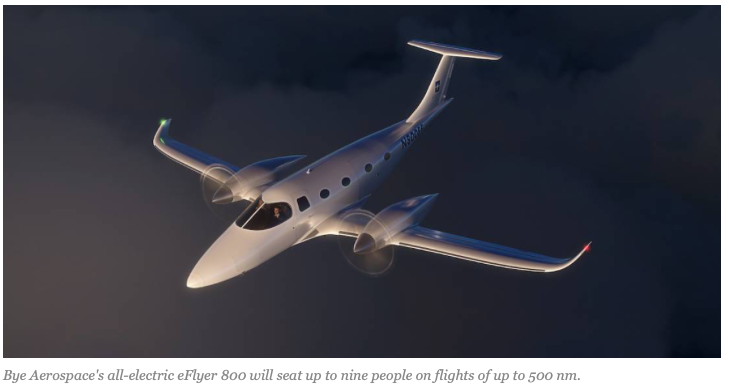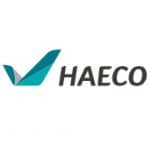Bye Electric eFlyer 800 Seeks To End King Air’s Reign
by Charles Alcock – April 22, 2021 AINonline
Bye Aerospace today unveiled plans to enter the business aviation market with the eFlyer 800, an all-electric aircraft powered by a pair of Safran’s Engineus electric motors. The twin will be able to carry seven passengers and two pilots on flights of up to 500 nm at 320 knots, it added.
The new model will compete with existing turboprop models such as the Beech King Air 260 and Daher TBM 910, albeit with less than one-third of the range. Denver-based Bye Aerospace indicated it expects to complete type certification in between four and six years from now, but said that it already has “customer deposit agreements” from undisclosed air taxi, charter, and cargo operators in the U.S. and Europe.
 Bye Aerospace is working toward FAA Part 23 type certification for its two-seat eFlyer 2 model, which will mainly be used for flight training. It is also developing a four-seat eFlyer 4 aircraft that could also be used for air taxi and cargo missions, as well as for more advanced flight training.
Bye Aerospace is working toward FAA Part 23 type certification for its two-seat eFlyer 2 model, which will mainly be used for flight training. It is also developing a four-seat eFlyer 4 aircraft that could also be used for air taxi and cargo missions, as well as for more advanced flight training.
Both of these eFlyer models are also powered by the Safran motors, which have a power rating ranging from 50 kW to 500 kW/1 MW. These will be supplied with the French company’s GeneusGRID electric distribution and network protection system.
The eFlyer 800 is expected to feature new lithium-sulfur batteries being developed by UK-based Oxis Energy. Bye is aiming to achieve a battery recharge time of between 20 and 30 minutes.
According to Oxis, the first-generation of these batteries have a specific energy of 450 Wh/kg and an energy density of 550 Wh/L. The company believes these levels could be boosted to 550 Wh/kg and 700 Wh/L by late 2023, and then to 600 Wh/kg and 900 Wh/L by 2026.
Generally speaking, energy levels of around 400 Wh/kg have been regarded by some as the tipping point for making lithium-ion batteries viable for electric aircraft. Currently, levels of around 220 to 250 Wh/kg are more typical in the sector.
Bye Aerospace claims that operating costs for the eFlyer 800 will be one-fifth of comparable jet-A-powered aircraft, based on the assumption that electricity will cost less than fuel and that electric motors will require less maintenance than turboprop engines. “The eFlyer 800 is the first all-electric propulsion technology airplane that achieves twin-turboprop performance and safety with no carbon dioxide and extremely low operating costs,” said company founder and CEO George Bye. “This type of remarkable economy and performance is made possible by the electric propulsion system and advanced battery cell technology that results in significantly higher energy densities.”




